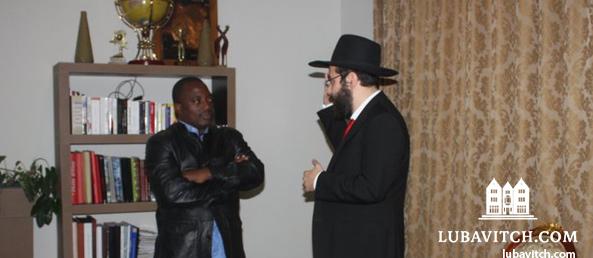(lubavitch.com) Several hours before Rosh Hashanah set in, Chabad Rabbi Shlomo Bentolila found himself in the offices of Joseph Kabila, President of the Democratic Republic of Congo (DRC).
President Kabila invited the Chief Rabbi of the DRC to receive his good wishes for the Jewish community in honor of the New Year, and to wish Bentolila, who is also Chabad’s representative to Central Africa, well in all of his endeavors. Rabbi Bentolila represents Jews living in 13 African countries.
Eight of those countries were helped these High Holy Days by 14 Chabad rabbinical students. Under the leadership of Rabbi Bentolila, the rabbis helped organize and lead services and festival meals, taught adults and children about their heritage, and installed hundreds of mezuzahs. Though most visited for an average of two weeks, the community will enjoy the benefit of their tour for a long time to come.
“Africa is a place where people could get lost spiritually,” explains Rabbi Bentolila.
“But on the eve of the High Holidays, the Jewish heart is sensitized to anything Jewish. These days [when the rabbis come] are the boosters, then the rest of the year we try to keep that flame more or less alive.”
Rabbis Levi Kotlarsky and Dov Spitezki flew from New York’s JFK airport to Johannesburg where they transferred for the five-hour flight to Mauritius, via Madagascar. Once on this beautiful island in the middle of the Indian Ocean, the pair of 20-something rabbis gathered the community for Yom Kippur services and left the fixings (including the ‘four species’ and a sukkah) for the upcoming holiday of Sukkot. Roughly 50 Jews call the island home, gathering as a community once a year, on Yom Kippur.
Mauritius’ Jewish past dates back to 1940 when 1,584 Jewish refugees were shipped to the island at the behest of the British mandate in Palestine. Their war years were spent in a detainment camp; in 1945 they were allowed to make aliyah. During those five years, 60 babies were born and 128 people died. Last week, Kotlarsky and Spitezki recited Psalms at the well-tended gravesites of the Mauritius Jewish Cemetery.
Today’s small community boasts members from South Africa, Australia, France, and Israel. Most of these residents are involved in the textile and diamond industries, though the community’s president breeds crocodiles, native turtles, and monkeys. Kotlarsky says he plans to keep in touch with the island’s inhabitants, after leaving them with a strong message.
“We tried to impress upon the people that they must get together more frequently in order to grow in their Judaism.”
“The key is unity and inclusiveness,” explains his father Rabbi Moshe Kotlarsky, Vice Chairman of Merkos, the Chabad-Lubavitch educational division. “That’s the message of our rabbinical students, and it’s in that spirit that they reach out to Jewish people wherever they are found.”
“Our rabbinical students are especially vital in regions such as Central Africa where these semi-annual visits may well be the only Jewish experience for individuals in these communities.”
Over the years, the Israeli inhabitants of Abuja have grown to appreciate these visits more and more. “Many of them came here to make some money in the construction business to bring back to Israel,” explains Yossi Shuchat who is currently in the Nigerian capital. “But they ended up staying and now their children are older. The parents are very worried because these children can’t read Hebrew and don’t know anything about Judaism.”
To address that problem, Shuchat conducts a daily after-school camp for dozens of children and Sunday programming for 60. One afternoon featured a holiday-themed carnival in which participants visited six booths to learn about each festival. At the Rosh Hashanah table they raced to eat apple and honey on a stick; for Sukkot, they decorated a large sukkah. When the holiday begins Friday night, Shuchat will host meals in a large sukkah and walk to each family’s compound to share the joy of Sukkot.
“Sometimes the people may seem quite disinterested,” he says. “But when they see us coming to each of their distant worksites and homes, they are so happy.”
Back in Kinshasa, Bentolila is putting the finishing touches on his own sukkah, an air-conditioned structure that holds 100 people. He is also fielding calls from Jews throughout the region who need help finding kosher food, prayer services, and encouragement. Though he visits each country a couple times per year, Bentolila says the junior rabbis’ trips provide the backbone for the tiny individual communities that dot the African landscape.
In an email to Bentolila, a prominent member of the Jewish community in Bata Equatorial Guinea, Leonardo Insani writes:
“It is very difficult for me, and I think also for every person, to find the rights words to tell you thank you in the right dimension in accord with your act. No words can describe how the people will be feeling in this hag [holiday] with the help of CHABAD by your person.”

Be the first to write a comment.